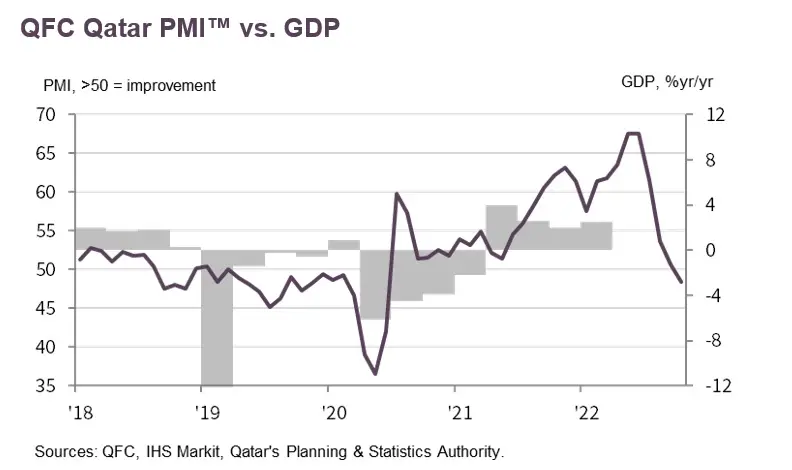PHOTO
- Headline PMI at 28-month low
- Forthcoming FIFA World Cup supports another improvement in sentiment
- Data were collected 12-24 October 2022.
Doha, Qatar – The latest Purchasing Managers’ Index™ (PMI™) survey data from Qatar Financial Centre (QFC) signalled an overall moderation in the non-oil private sector at the start of the fourth quarter. The rate of expansion in total activity remained marked, however, as firms prepare for an influx of sales in anticipation of the FIFA World Cup. New orders eased while purchasing activity also cooled. Meanwhile, firms trimmed their headcounts to a record degree in an effort to save on costs. Prices data signalled improving profitability with a near-record uplift in selling charges alongside only a marginal increase in input costs.
Expectations were meanwhile boosted by the fast-approaching World Cup with sentiment at a two-year high in October.
The Qatar PMI indices are compiled from survey responses from a panel of around 450 private sector companies. The panel covers the manufacturing, construction, wholesale, retail, and services sectors, and reflects the structure of the non-energy economy according to official national accounts data.
The headline Qatar Financial Centre PMI is a composite single-figure indicator of non-energy private sector performance. It is derived from indicators for new orders, output, employment, suppliers’ delivery times and stocks of purchases.
At 48.4 in October, down from 50.7 in September, the latest PMI pointed to a moderation in non-energy private sector business conditions. The latest result brought an end to 27 successive months of growth. That said the headline figure was only marginally below the 50.0 neutral value.
Central to the deterioration was a cooling of new orders which fell for the second month in a row. The slowdown was more notable than that seen in the previous survey period. In contrast, output expanded at a marked and above trend pace amid efforts to boost output ahead of the World Cup at the end of November.
The sustained moderation in new orders led non-energy companies in Qatar to scale back on their purchasing activity. The rate of decline was sharp, but softer than the contractions seen during the height of the pandemic.
Softer inflows of new work allowed firms in Qatar's non-energy sector to progress existing backlogs. The rate of contraction was among the sharpest in the survey's history.
Subsequently, firms cut their staffing levels at the start of the quarter thereby signalling three successive months of job shedding. The rate of decrease was sharp and the quickest in the survey's more than five-and-a-half-year history.
Turning to prices, overall input prices rose for the third month running. A renewed uptick in purchase costs drove the latest increase. The rate of inflation was only marginal, however, amid a fall in staff costs.
Firms in turn raised their selling prices sharply, and at the third-quickest rate in the survey's history, behind that seen only in the previous survey period and November 2021. According to panel comments, firms hiked charges to capitalise on greater tourist activity.
Looking ahead, firms were widely upbeat about their output expectations over the year ahead. Firms were hopeful that the FIFA World Cup would have a positive impact on output growth.


Financial sector activity continues to expand sharply
- Activity expands for the sixteenth month in succession
- New business rises marginally in October
- Sentiment remains firmly in positive territory
The latest PMI data on Qatar's financial services sector signalled a further marked improvement during October, with business activity now increasing in each month since July 2021. The rate of output growth was robust and much quicker than the long-run series average.
New orders rose again, as has been the case since June 2020. The rate of growth was the softest for 15 months, however.
Qatari financial service firms continued to cut their headcounts, although the rate of reduction was only slight. Firms remained optimistic that activity growth would continue over the next 12 months.
Prices data highlighted a slight decrease in input costs in October alongside a marginal reduction in selling charges.
Comment
Yousuf Mohamed Al-Jaida, Chief Executive Officer, QFC Authority:
"The start of the fourth quarter revealed a cooling of business conditions in Qatar's non-energy sector. While output continued to expand robustly, firms reported a further softening in new orders. Subsequently, businesses were keen to make efficiency gains where they could and reduced their buying activity during the month. There were also efforts to scale back headcounts which reduced at the quickest rate in the survey's history.
"Looking ahead, the FIFA World Cup begins at the end of November and will bring with it a large influx of tourist activity to Qatar. Sustained increases in output suggest businesses are geared up for a busy four weeks of trading. There are also hopes that the sporting event will have a favourable impact on the country over the next 12 months with sentiment improving to a two-year high."
-Ends-
ABOUT THE QATAR FINANCIAL CENTRE
The Qatar Financial Centre (QFC) is an onshore business and financial centre located in Doha, providing an excellent platform for firms to do business in Qatar and the region. The QFC offers its own legal, regulatory, tax and business environment, which allows up to 100% foreign ownership, 100% repatriation of profits, and charges a competitive rate of 10% corporate tax on locally sourced profits.
The QFC welcomes a broad range of financial and non-financial services firms.
For more information about the permitted activities and the benefits of setting up in the QFC, please visit qfc.qa
@QFCAuthority | #QFCMeansBusiness@QFCAuthority | #QFCMeansBusiness
MEDIA CONTACTS
QFC: Nadine Assi, Marketing & Corporate Comunications Department, n.assi@qfc.qa
ENQUIRIES ABOUT THE REPORT
QFC: qatarpmi@qfc.qa
ABOUT S&P GLOBAL
S&P Global (NYSE: SPGI) S&P Global provides essential intelligence. We enable governments, businesses and individuals with the right data, expertise and connected technology so that they can make decisions with conviction. From helping our customers assess new investments to guiding them through ESG and energy transition across supply chains, we unlock new opportunities, solve challenges and accelerate progress for the world.
We are widely sought after by many of the world’s leading organizations to provide credit ratings, benchmarks, analytics and workflow solutions in the global capital, commodity and automotive markets. With every one of our offerings, we help the world’s leading organizations plan for tomorrow, today. www.spglobal.com.
ABOUT PMI
Purchasing Managers’ Index™ (PMI™) surveys are now available for over 40 countries and for key regions including the Eurozone. They are the most closely watched business surveys in the world, favored by central banks, financial markets and business decision makers for their ability to provide up-to-date, accurate and often unique monthly indicators of economic trends.
https://ihsmarkit.com/products/pmi.html.
METHODOLOGY
The Qatar Financial Centre PMI™ is compiled by S&P Global from responses to questionnaires sent to purchasing managers in a panel of around 450 private sector companies. The panel is stratified by detailed sector and company workforce size, based on contributions to GDP. The sectors covered by the survey include manufacturing, construction, wholesale, retail and services.
Survey responses are collected in the second half of each month and indicate the direction of change compared to the previous month. A diffusion index is calculated for each survey variable. The index is the sum of the percentage of ‘higher’ responses and half the percentage of ‘unchanged’ responses. The indices vary between 0 and 100, with a reading above 50 indicating an overall increase compared to the previous month, and below 50 an overall decrease. The indices are then seasonally adjusted.
The headline figure is the Purchasing Managers’ Index™ (PMI). The PMI is a weighted average of the following five indices: New Orders (30%), Output (25%), Employment (20%), Suppliers’ Delivery Times (15%) and Stocks of Purchases (10%). For the PMI calculation the Suppliers’ Delivery Times Index is inverted so that it moves in a comparable direction to the other indices.
Underlying survey data are not revised after publication, but seasonal adjustment factors may be revised from time to time as appropriate which will affect the seasonally adjusted data series.
Data were collected 12-24 October 2022.
For further information on the PMI survey methodology, please contact economics@ihsmarkit.com.
CONTACT
S&P Global: Sabrina Mayeen
E. Sabrina.mayeen@spglobal.com




















